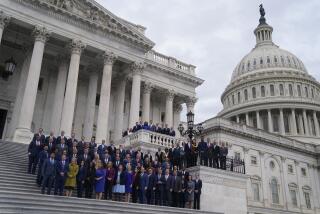Let’s Celebrate Where the Constitution Was Set Right
- Share via
Unlike many scholars and jurists, I believe that the priority of the bicentennial celebration should not be to dwell exclusively or even primarily on the vision of the Founding Fathers or the world of 1787. Of course we should recognize their contribution as a momentous start to what America is and to what America someday must be. More important, however, is the fact that the Constitution has been an evolving document, continuously expanding the freedoms, rights and liberties of all our citizens.
The genius of our Constitution and our nation has been the ability to go beyond the original principles and the original vision of men of 1787 who lived in a less complex world than our own. During this bicentennial era, we should celebrate the highest ideals and attainments made possible over two centuries, particularly the attainments to which the Founding Fathers did not aspire or even contemplate.
We should applaud a sense of mission, a belief that through this great document there can be an even better tomorrow and that the present obstacles and shortcomings will exist only to be overcome.
Thus, during this bicentennial, we do not celebrate or condone the three-fifths clause; we do not celebrate the clause protecting the international slave trade; we do not celebrate or condone the fugitive-slave clause.
We do not meet to pay tribute to Chief Justice Roger Brook Taney, who, in the Dred Scott case, said that blacks “had no rights which the white man was bound to respect.”
We do not meet to celebrate the Supreme Court’s 1896 Plessy vs. Ferguson “separate but equal” doctrine or the other tragic Reconstruction cases and statutes that devastated the black community for most of the 20th Century.
We do not meet to celebrate the era that allowed both public and private sectors to impose an oppression against blacks when the law and society would never tolerate that level of egregiousness against whites, Catholics, Jews or Protestants, Italians, Irishmen or anyone else of lighter hue.
We do not meet to celebrate the original vision of the forefathers that precluded all women from voting and denied the franchise to most poor whites.
We do not meet to honor the limited vision as to the potential of women exemplified by the revered Thomas Jefferson, who said, “Were our state a pure democracy, there would still be excluded from our deliberations . . . women who, to prevent deprivation of morals and ambiguity of issues, should not mix promiscuously in gatherings of men.”
We do not meet to celebrate the limited constitutional vision reflected in Bradwell vs. State of Illinois, in which the Supreme Court held in 1873, with only one dissent, that a married woman could be precluded from practicing law in Illinois without violation of the U.S. Constitution.
Instead, during this bicentennial year we should celebrate the true egalitarian spirit of the 13th, 14th, 15th and 19th amendments and the related civil-rights acts, in which our nation has repudiated in part the racism and sexism sanctioned by earlier generations.
We should celebrate Brown vs. Board of Education and Bolling vs. Sharpe, which held in 1954 that neither the states nor the federal government could require racial segregation in public schools.
We should celebrate the civil-rights acts and the Supreme Court decisions like the one rendered recently in Johnson vs. Transportation Agency, Santa Clara County, California, in which the court held that under Title VII, “in making promotions to positions within a traditionally segregated job classification in which women have been significantly underrepresented, the agency is authorized to consider as one factor the sex of a qualified applicant.”
We should celebrate the fact that women at long last are beginning to have an increasingly significant presence in the professions and in the nation.
We should further celebrate during this bicentennial the historic moments when our nation’s consciousness moved forward--as when President Dwight D. Eisenhower, though not in sympathy with Brown vs. Board of Education, nevertheless insisted that the decree of the district court in Little Rock be enforced so that 11 black children would be admitted to the high school, even if it required calling out federal troops.
We should celebrate the perspective and actions of President John F. Kennedy, who rejected Gov. George C. Wallace’s efforts to stop two fully qualified black students from going to the University of Alabama, and then told the nation: “The heart of the question is whether all Americans are to be afforded equal rights and equal opportunities, whether we are going to treat our fellow Americans as we want to be treated.”
We should further celebrate the broad view of President Lyndon B. Johnson, who asserted: “You do not take a person who, for years, has been hobbled by chains and liberate him, bring him up to the starting line of a race and then say, ‘You are free to compete with all the others,’ and still justly believe that you have been completely fair.”
Thus it is not enough just to open the gates of opportunity. All our citizens must have the ability to walk through those gates, and this challenge is the next and the more profound stage of the battle for civil rights.
Throughout this year of celebrating the Constitution, its authors’ words have been brought before us anew, in both their errors and their wisdom. I would like to add to this canon the perceptive words written by Langston Hughes in the perilous year 1964: “To save the dream for one / It must be saved for all.”


